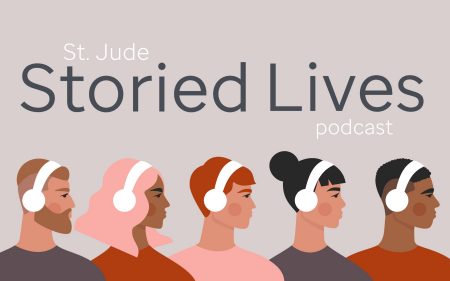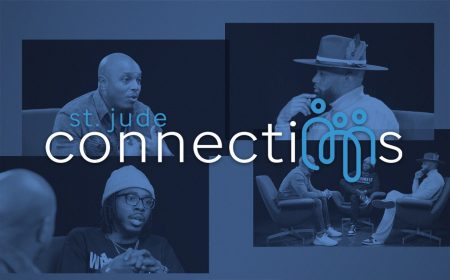
Determined Ukrainian aids kids facing battle on two fronts
St. Jude partner working to sustain essential treatment for young cancer patients even as she’s stranded 4,600 miles from home.

March 01, 2022 • 6 min

Olga Kudinenko was ordering breakfast at her hotel in Thailand when the text came.
She’d taken her mother and daughter on vacation during her daughter’s winter school holiday. They’d packed just enough clothes for the week-long trip.
It was 5:24 a.m. back home in Kyiv, Ukraine, when Olga saw the text from her colleague. Olga was five hours ahead and more than 4,600 miles away.
My husband woke me up and told me that Putin announced the beginning of the real war, the text read.
Olga wrote back: I’m reading on Facebook that people hear the sounds of exploding. Have you heard?
Her colleague replied: My husband heard. I was sleeping.

After months of uncertainty, Russia invaded Ukraine before dawn on the morning of Feb. 24.
Olga, founder of the Tabletochki Foundation — a charity devoted to supporting pediatric oncology patients in Ukraine, and a St. Jude and ALSAC partner — worried about the safety of her family, her staff and the 500 children a month across Ukraine who rely on her organization. Tabletochki supplies medicine not available through public resources to 21 oncology units around the country.
In the days ahead, she’d worry about everything from getting the kids food and medicine, to getting them across the border to safety. Hers is a story of absolute resolve, day after day, to give every child with cancer in Ukraine a chance to live despite the rapidly evolving circumstances of war.
“One of your kids may die because of cancer,” she said. “And other parts of your family may die because of the war. So, I cannot imagine how hard (it is) for those families in hospitals to be separated right now — to fight for their lives on two fronts.”
First-day horror
Olga’s first thought was to book the next ticket home, but with heavy artillery and explosions in major cities, including the capital city of Kyiv, the skies were closed to commercial airlines.
Olga was frantic to reach her father and brother and her best friend of 20 years to make sure they were safe. Her three small nieces, her closest friends, her dog, her cat. Nearly everything and everyone dear to her was in Kyiv.
It was the end of the month, too, and staff needed to be paid. There was no way to tell how long banks would stay open, so she authorized the release of the funds so families who fled would have cash.
Olga told staff not to go to the office in the city center, and instead look for a safe place to be with their families — wherever they could find one. To not be alone. Then she checked with doctors about what they’d need in the coming days.
With air raid sirens blaring, doctors moved their patients to hospital basements, which were not set up to run medical equipment. At one hospital, kids huddled in a basement with peeling paint and exposed pipes. Their faces glowed in the light of cell phones and tablets. Some slept in makeshift beds on the floor, elbow to elbow. They needed extension cords, batteries, lights — the same equipment the Army needed. Olga called her partners and directed volunteers to pick up the supplies and deliver them.
Then she got a message that the hospitals needed food, too. Her staff called the food banks of three major supermarket chains.
“They told us … ‘We cannot give you anything because we are working with the Army first. But give us time, and we will call you back in an hour,’” Olga said. “Everyone called us in an hour.”
The supermarkets donated porridges, bread, tea and snacks. Olga took to social media, asking bakers where she could buy bread, and they donated 300 loaves.
“Nobody knows what will happen next,” Olga said.
With the shock of an attack that few Ukrainians believed would actually come, one doctor mentioned that a young patient was scheduled to have a No More Chemo Party the next day, that everything was set. Of course, they’d need balloons.
Olga gave instructions for her driver to deliver them.
“But the next morning he asked me if we are doing this because everything is not calm in the city,” she said.
Somehow their minds had not yet adjusted. There would be no balloons for the little girl. But a clown did come to the basement so the children could have a celebration.
Focused on the kids
On the second day of bombing — after locating the extension cords, lights and batteries — Olga turned her attention to the children’s medicine.
All the pharmacies were closed. Pharmaceutical companies' storage facilities were located in areas of heavy fighting. She worried, too, about the regional hospitals where doctors had been redirected to treat soldiers who’d been injured in the war. Some children had been discharged from those hospitals.
Doctors provided lists of medicines and Olga and her staff called partners to see who could provide them. The pharmaceutical companies donated meds, but not every kind they needed. One colleague and some volunteers made a harrowing trip to retrieve them.
This is the time of year, too, that a government program usually provides a large influx of chemotherapy medicine. But with bridges and roads bombed out, there’s no way to know when they might arrive.
But by the third day of fighting, Olga realized it would be better to get kids out of the country for comprehensive treatment than to try to bring more medications in. They couldn’t offer these sick children comprehensive care; most needing long-term treatments for acute lymphoblastic leukemia. They couldn’t be certain they’d find the right medications, and bone marrow transplants for those who needed them were out of the question.
So, she started texting all her contacts again: We need to find cars. Who can help us with a car?
Who had a taxi or a logistics company? Who could drive?
A major donor offered to transport 28 people — 14 children and 14 parents — to safety. Three were candidates for bone marrow transplants.
As of March 1, the Tabletochki Foundation had gotten 35 patients across the border, but Olga’s work is only beginning. There are far more kids who need safe havens where treatment can continue uninterrupted.
“Right now, to clear the border with Poland is like 30 hours,” Olga said. “Poland has happily opened their arms to accept Ukrainian kids for help. However, 30 hours and more on a border is unbearable. And it’s really hard for any kid of any age and even adults. And for sick kids, it’s unbearable.”
St. Jude Children’s Research Hospital’s Global Alliance — a program that aims to increase survival rates of children with cancer and other catastrophic diseases worldwide — has partners in more than 60 countries around the globe, including in Ukraine, Poland, Moldova and Russia. Those partners support more than 100 hospitals and clinics.
Doctors and staff have been working with the Ukrainian clinics to move patients to hospitals in Poland. They’re focused on bone marrow transplantation, radiation therapy and other treatments no longer available in Ukraine.
ALSAC, the fundraising and awareness organization for St. Jude, provides foundations like Olga’s with advice and guidance on a broad assortment of business practices, including fundraising and media relations. In the midst of the crisis, she’s in nearly constant communication with ALSAC for additional assistance.
How to help
In the days ahead, Olga will continue to coordinate the transport of children with cancer in Ukraine to waiting medical facilities elsewhere, though she remains far from home. She has a return ticket but can’t get back in the country. Even if she could, she’d likely be in a bomb shelter 23 hours a day as some of her friends are – leaving for an hour to shower and find food.
Olga isn’t a doctor. She doesn’t have a job in defense. She doesn’t even drive. So, there’s not much she could do on the ground. She’s more effective with her phone and social media — and that can be anywhere.
She’s just not sure where anywhere is yet. Maybe Austria, where Tabletochki has partners, or the United States where she can organize Ukrainian-Americans to help. Wherever she is, she’ll worry.
“They’re leaving homes, friends, families, and they’re constantly worrying: Will they have a place to come back home? Will they have a home? Will their relatives — grandmas, granddads, fathers, brothers, sisters — be alive?” she said.
She knows there’s international media attention on Ukraine, and that the eyes of the world are watching. She knows people want to help, and she hopes they will offer support for kids with cancer in her home country when they need it most — with money, medicine and even kind thoughts.
“I don’t know — nobody knows — how long this war will take,” Olga said. “And we don’t want to lose time and opportunity for those kids to have a — I don’t want to say normal life, because it looks like nobody will have a normal life in Ukraine anymore after the war. We all had some kind of trauma already.
“But to have a life without cancer at least. That’s what we can try to do.”
For more information about the Tabletochki Foundation, visit https://www.globalgiving.org/projects/war-in-ukraine-help-children-with-cancer
Media coverage







